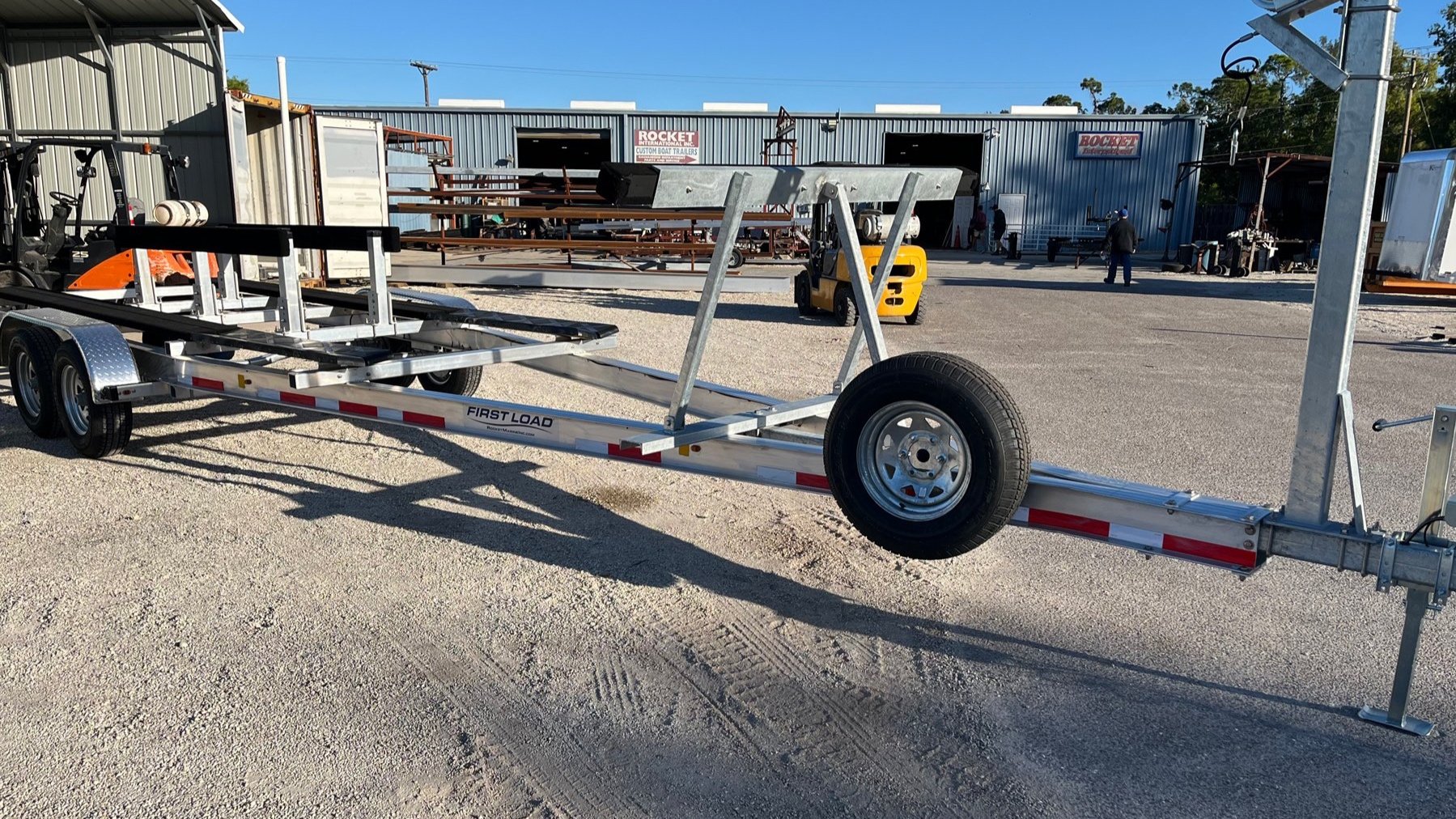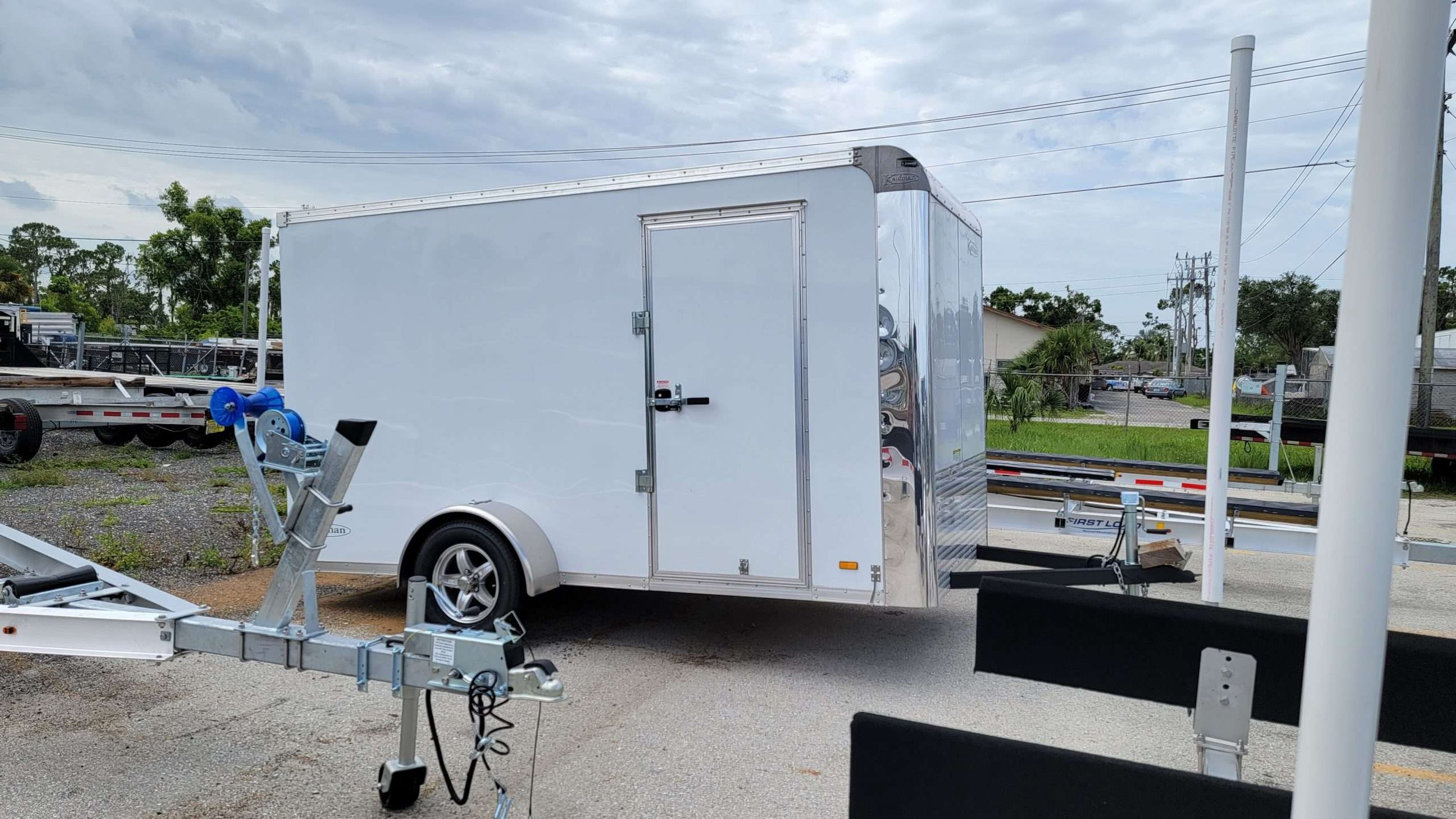
Trailer Rentals
Boat / Jet Ski / Cargo Trailers
Important Rental Notes:
$100 security deposit due at time of booking.
Deposit will be forfeited if reservation is canceled by renter.
Deposit will be refunded upon return of rental, minus deductions for any damage and/or loss.
Additional loss, damage, and any tolls incurred during rental period will be charged to renter.
Our trailers have 5-pin flat electrical connectors
Driver’s license, credit card, and insurance card required at time of pickup
Trailer rentals are for the State of Florida only. Rented trailers must not leave the State.
Rocket Marine is not responsible for any damages to your boat or vessel that may occur during use of the rental trailer.
Aluminum 22′-24′ (AF2224TA)
Tandem Axle
Gross Weight: 7,000 lbs.
Trailer Weight: 1,000 lbs.
Load Cap: 6,000 lbs.
Ball Size: 2”
Rent for 1-4 Days: $129/day
Rent for 5+ Days: $119/day
Desired rental period:
Aluminum 24′-26′ (AF2426TC)
Tandem Axle
Gross Weight: 10,000 lbs.
Trailer Weight: 1,280 lbs.
Load Cap: 8,720 lbs.
Ball Size: 2 5/16”
Rent for 1-4 Days: $159/day
Rent for 5+ Days: $149/day
Desired rental period:
Aluminum 26′-28′ (AF2628TC)
Tandem Axle
Gross Weight: 10,000 lbs.
Trailer Weight: 1,280 lbs.
Load Cap: 8,720 lbs.
Ball Size: 2 5/16”
Rent for 1-4 Days: $159/day
Rent for 5+ Days: $149/day
Desired rental period:
Aluminum Catamaran 26′-28′ (AC2628TC)
Tandem Axle
Gross Weight: 10,000 lbs.
Trailer Weight: 1,340 lbs.
Load Cap: 8,660 lbs.
Ball Size: 2 5/16”
Rent for 1-4 Days: $169/day
Rent for 5+ Days: $159/day
Desired rental period:
Aluminum 28′-30′ (AF2830TE)
Tandem Axle
Gross Weight: 12,000 lbs.
Trailer Weight: 2,200 lbs.
Load Cap: 9,800 lbs.
Ball Size: 2 5/16”
Rent for 1-4 Days: $159/day
Rent for 5+ Days: $149/day
Desired rental period:
Aluminum 30′-32′ (AF3032TRI16E)
Triple Axle
Gross Weight: 18,000 lbs.
Trailer Weight: 2,400 lbs.
Load Cap: 15,600 lbs.
Ball Size: 2 5/16”
Rent for 1-4 Days: $200/day
Rent for 5+ Days: $190/day
Desired rental period:
Aluminum Pontoon / Tri 20′-24′ (AP2024TA)
Tandem Axle
Gross Weight: 7,000 lbs.
Trailer Weight: 1,100 lbs.
Load Cap: 5,900 lbs.
Ball Size: 2”
Rent for 1-4 Days: $169/day
Rent for 5+ Days: $159/day
Desired rental period:
Aluminum Pontoon / Tri 26'-28' (AP2628TE)
Tandem Axle
Gross Weight: 7,000 lbs.
Trailer Weight: 1,100 lbs.
Load Cap: 5,900 lbs.
Ball Size: 2”
Rent for 1-4 Days: $169/day
Rent for 5+ Days: $159/day
Desired rental period:
Aluminum Personal Watercraft Trailer (AJ2)
Single Axle
Gross Weight: 2,600 lbs.
Trailer Weight: 350 lbs.
Load Cap: 2,250 lbs.
Ball Size: 2”
Rent for 1-4 Days: $100/day
Rent for 5+ Days: $95/day
Desired rental period:
Cargo Trailer 12′ x 6′ (CG126)
Single Axle
Gross Weight: 2,990 lbs.
Trailer Weight: 1090 lbs.
Load Cap: 1,990 lbs.
Ball Size: 2”
Rent for $80/day
Desired rental period:
TIPS FOR BOAT TOWING
Florida holds the most recreational boats per capita when compared to the rest of the United States, and as such, there lay regulations for towing boats. In the state of Florida, these laws are designed to help keep everybody safe. Should you not follow these regulations you will be fined for putting people in danger.
Speed Limit: Under the law, anyone towing a trailer is limited to 65 miles per hour while within the state of Florida.
Length, Width, and Height: Within Florida, you can not have a towing trailer that is longer than 40 feet in length under law. Similarly so, under the law of Florida, the width of the trailer cannot go above 8 feet and 6 inches and its height can not go above 13 1/2 feet. There’s also a regulation within the law that states a vehicle and trailer together can not exceed 65 feet total when combined. An over-diversion permit can be acquired by visiting the Florida State Department of Transportation website and applying for it there. Other permits you can apply for on this site are also a blanket permit and trip permit, however, you can self-issue a trip permit when a load is up to 16 feet wide, 150 feet long, 18 feet high, and 200,000 pounds without needing to contact a permit office.
It is advised that you do a full pre-tow safety inspection before you begin trailering.
It’s important that your tongue weight is around 10-15% of your load. If it is under this threshold your trailer may sway which can be extremely dangerous. Should you think your trailer or load is swaying it is advised you slow down immediately, pull over, and adjust the load as necessary.
Ensuring that the trailer/load is level is important to do before trailering.
In order to avoid clipping a curb or any other obstructions on the road, you should make wide turns.
When towing a heavy load you’ll find that braking takes longer which will require more distance between you and your desired braking spot. Thus, it’s a good idea to leave extra following room between your vehicle and those in front of you.
If a wind blast shoves your rig sideways, you shouldn’t step on the brakes. Instead, you should minimize how much you are accelerating by taking your foot off the accelerator.
When you are trailering with a load, you’ll find that your rear-view mirror is useless due to the bow of your boat. Thus, it is advised you use your side-view mirrors instead.
Once you arrive at a boat ramp it’s important to inspect your trailer tires.










